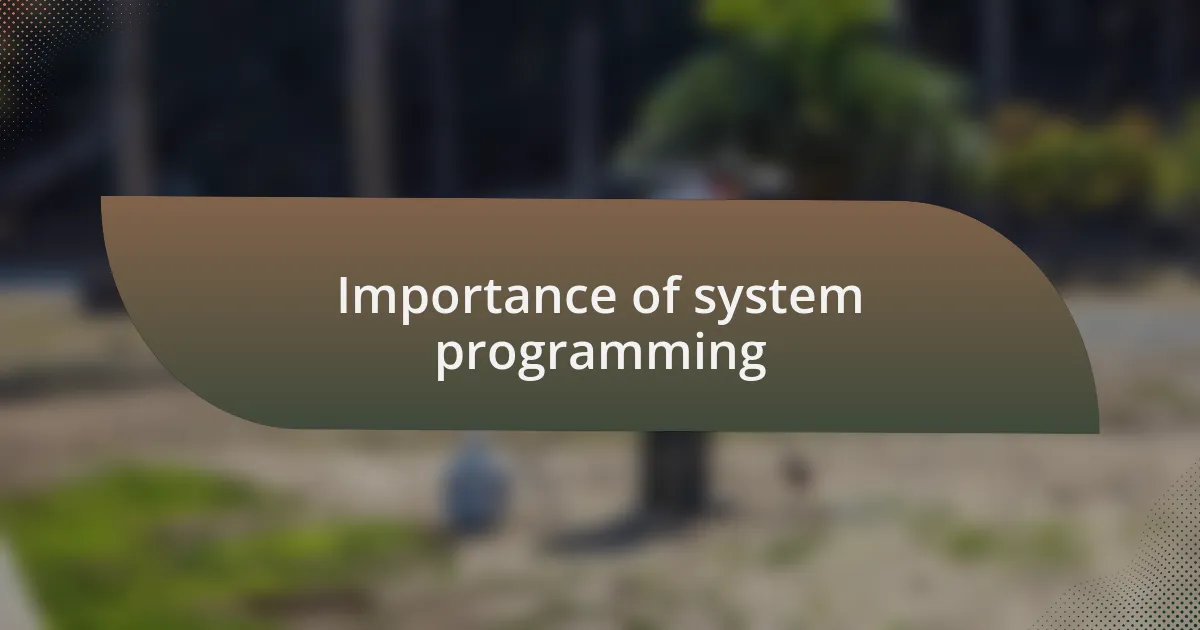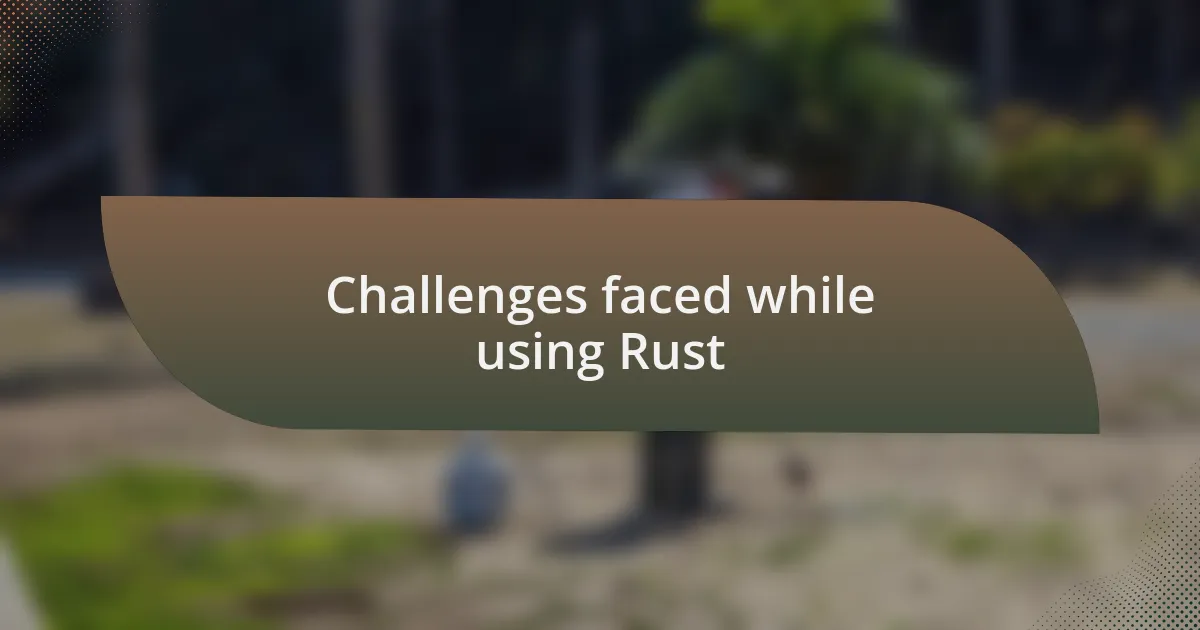Key takeaways:
- Rust’s ownership model prevents data races at compile time, enhancing safety in concurrent applications.
- The language provides memory safety without a garbage collector, allowing developers to write low-level code confidently.
- Engaging with the supportive Rust community significantly aids in learning and overcoming challenges.
- Rust’s strict borrow checker and steep learning curve require persistence but ultimately lead to safer, more robust code.

Understanding Rust programming language
Rust is a systems programming language that emphasizes safety and performance, which is something I genuinely appreciate. When I first started working with Rust, I was struck by its ownership model. It prevents data races at compile time by making sure that only one owner can access mutable data, which is a game-changer for writing robust concurrent applications. Have you ever struggled with bugs that only appeared under heavy load? Rust’s design helps you avoid that headache.
One aspect that truly stands out for me is Rust’s emphasis on memory safety without a garbage collector. Initially, I was skeptical about how this would behave in practice. However, after working through a few projects, I learned to appreciate its ability to free up memory with zero-cost abstractions. It felt liberating knowing that I could write low-level code while still being shielded from common pitfalls of unsafe memory access. Isn’t it refreshing to focus more on solving problems rather than worrying about the memory leaks that often come with other languages?
Moreover, the community surrounding Rust is incredibly welcoming and supportive, which I didn’t expect when I joined. Whenever I faced challenges, there were always resources—like the Rust Book and friendly forums—to help guide me through. Have you ever felt stuck in your coding journey? Engaging with a community that shares your passion can make all the difference.

Importance of system programming
System programming is crucial because it lays the groundwork for operating systems and low-level applications that interact directly with the hardware. I recall when I was diving into the world of device drivers; understanding how these elements work together opened my eyes to the intricate dance between software and hardware. Have you ever wondered what truly powers our computing devices? That interaction at the system level is where the magic happens.
Additionally, system programming contributes to performance optimization. I remember tweaking a kernel module to enhance system responsiveness; the sense of accomplishment was unmatched when I saw the improvements firsthand. The ability to make direct changes at the system level allows developers to achieve efficiency that higher-level languages simply cannot match. Isn’t it fascinating how those small adjustments can lead to significant performance gains?
Finally, system programming enhances security by allowing for low-level control over various resources. During a project focused on system security, I discovered vulnerabilities that could be patched more effectively by altering the underlying code. This experience highlighted for me how important system programming is in protecting applications from potential threats. Wouldn’t you agree that a deep understanding of these fundamentals is essential for any developer striving to build secure software?

Key features of Rust
Rust stands out in system programming due to its emphasis on memory safety without sacrificing performance. I remember my first encounter with its ownership model; the way it prevents data races made me feel relieved as a developer. Have you ever had that sinking feeling of dread when debugging memory issues? Rust’s strict compile-time checks can alleviate that anxiety, allowing you to focus on building rather than tracking down elusive bugs.
Another significant feature is Rust’s concurrency model, which empowers developers to write highly concurrent code. I recall a project where I leveraged Rust’s async capabilities to handle multiple threads effectively. The satisfaction I felt when my application scaled effortlessly was invigorating. Doesn’t it feel great when the tools you’re using can help you harness the full power of your hardware?
Furthermore, Rust’s rich ecosystem, with tools like Cargo for package management, enriches the development experience. When I started integrating new libraries, the seamless process of dependency management in Cargo made the workflow so much smoother. The excitement of effortlessly adding features without the usual library conflicts was truly refreshing. Have you experienced the joy of a well-managed project that just flows? That’s what Rust can bring to your development journey.

My personal experience with Rust
Diving into Rust was quite an adventure for me. I vividly recall the moment when I compiled my first program and received a barrage of error messages. Initially, it felt overwhelming, but soon I realized these messages were incredibly helpful. Each one guided me toward writing better, safer code. Have you ever had that “light bulb” moment when everything clicks? That’s how I felt, and it marked the start of a rewarding relationship with Rust.
As I progressed, I remember working on a small embedded systems project where I had to manage hardware resources carefully. Rust’s ownership model was a game changer; I could almost feel a weight lifted off my shoulders knowing that the compiler would help prevent mistakes that I might overlook. There’s something reassuring about a tool that has your back, wouldn’t you agree? This sense of security allowed me to experiment freely, pushing the boundaries of what I thought was possible in that project.
I can’t help but share my joy when I discovered Rust’s community support. It was during a late-night coding session when I posted a question on a forum and received not just answers, but encouragement and suggestions that transformed my approach. That sense of camaraderie made me feel less isolated in the journey of learning this powerful language. Have you ever been uplifted by the support of others as you navigate a challenging path? For me, that connection was invaluable—it reminded me of the importance of community in software development.

Challenges faced while using Rust
One challenge I encountered while using Rust was grappling with its strict borrow checker. Initially, I found myself in a tug-of-war with the rules about borrowing data, which left me frustrated at times. I remember spending hours trying to figure out why a simple function wouldn’t compile, only to realize I’d overlooked a lifetime aspect. Have you ever felt handcuffed by rules in a programming language? It takes time to fully understand these concepts, but mastering them ultimately leads to stronger, safer code.
Another obstacle that surprised me was Rust’s steep learning curve, especially for developers accustomed to languages that let you write code more freely. Transitioning to Rust felt like stepping into a meticulously structured world where every detail mattered. I often wondered if I was cut out for the rigidity. But through persistence, I discovered the rewards far outweighed the early struggles. Each challenge pushed me to think critically, refining my approach to programming.
Moreover, the tooling around Rust is constantly evolving, which sometimes leads to the frustration of dealing with unstable libraries or changing APIs. While it’s exciting to be part of a growing ecosystem, I found myself frequently updating my dependencies and adapting to new recommendations. Do you enjoy the thrill of fast-paced changes, or do you prefer stability? Personally, I appreciate the innovation, but I also crave a bit of consistency to keep my workflow smooth. Balancing these two can be tricky, yet it also fuels my passion for learning.